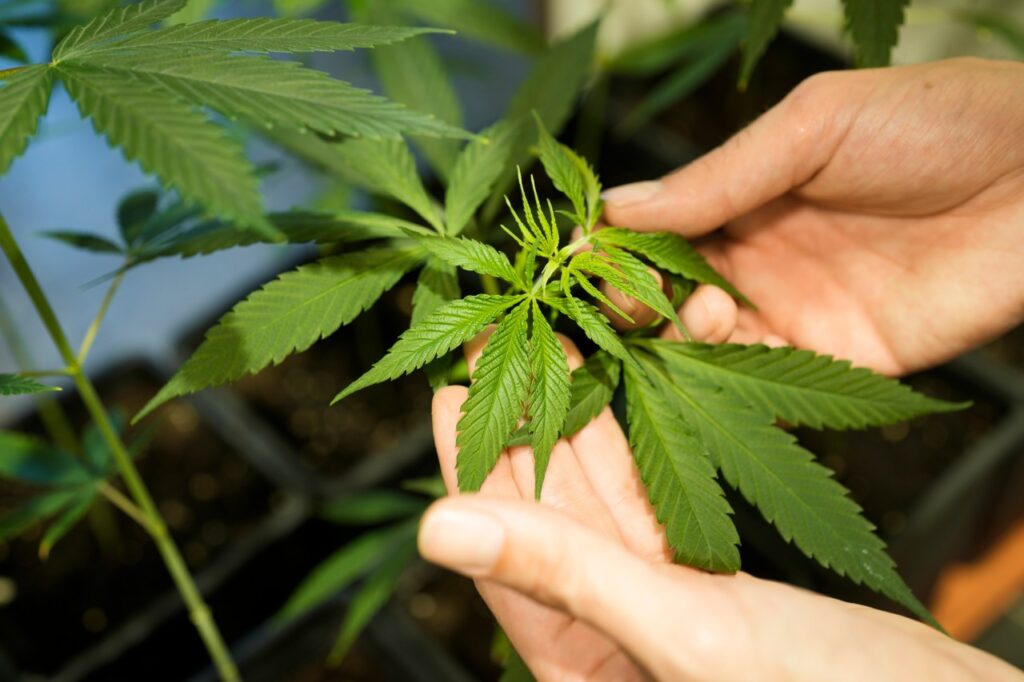
FILE – An employee shows growing marijuana or hemp plants in a box at the Cannabis Museum in Berlin, Germany, Tuesday, Aug. 15, 2023. The German parliament is scheduled to vote Friday, Feb. 23, 2024, on a government plan to ease restrictions on cannabis, which would decriminalize certain amounts of marijuana and allow members of “cannabis clubs” to purchase it for recreational purposes. (AP Photo/Markus Schreiber, File)
DENVER (KDVR) — The Colorado Attorney General's Office is suing a Colorado cannabis business and its owner, alleging that marijuana products sold as federally legal hemp products contained up to 35 times the legal concentration of THC.
This is the first such lawsuit to be filed since the state Legislature gave the Colorado Attorney General's Office the authority to enforce industrial hemp laws.
According to the complaint, Gee Distributors LLC and its owner, Christopher Eoff, were under investigation for a subsidiary called CBDDY that was founded in 2019 and based in Fort Collins. The business was dissolved in May 2023, according to the attorney general's complaint.
But while the Weld County-based company sold products it described as industrial hemp, the Colorado Attorney General's Office reported that CBDY primarily operated online and sold smokable cannabis flower, high-THC concentrates and edible marijuana products.
Although the company advertised its products as “100% compliant” with federal law, samples obtained from the company reportedly contained THC levels far above the federal limit, and the Attorney General's office said the products featured images specifically designed to appeal to children and had similar shapes and flavors.
“Colorado's legal cannabis regulations are designed to protect consumers, ensure the highest safety and quality standards, and keep cannabis out of the hands of children,” Weiser said in a statement. “In this case, the defendants recklessly sold products that were, in some cases, more potent than those sold in state-licensed dispensaries, with little regard for requirements like lab testing and age verification.”
Hemp-derived Delta-9 THC products are federally required to contain no more than 0.3% THC by dry weight, but Colorado also bans the sale of hemp that has been chemically altered to produce products that get users high. According to the Colorado Attorney General's Office, the 2018 policy change “has led to an increase in industrial hemp companies seeking to circumvent state regulations and taxes that apply to recreational marijuana.”
CBDDY promotes itself as a CBD oil business on Instagram, but calls itself a “THCa Flower and Delta 9 Edibles Store” on its website.
CBD (cannabidiol) is the active ingredient in marijuana that doesn't contain tetrahydrocannabinol (THC) and won't get you high on its own, according to the Mayo Clinic. The chemical has been shown to effectively treat seizures and is commonly available for purchase online. THCa is a precursor to THC and has no psychoactive properties in its raw form, according to a study published in the National Library of Medicine.
Colorado requires businesses that sell industrial hemp to have their products tested at one of 12 state-certified cannabis testing laboratories. The laboratories issue a Certificate of Analysis, but legal industrial hemp businesses aren't required to share it with customers.
But when companies sell products without properly disclosing their psychoactive ingredient content, consumers could unknowingly violate the law, fail drug tests or become intoxicated, according to the Colorado Attorney General's Office.
The Attorney General is seeking an injunction against CBDY and the other defendants that would “prevent the company from continuing to fraudulently sell its products and pay civil penalties and damages for repeated violations of Colorado's consumer protection laws.”
Consumers can report business scams to the Attorney General at StopFraudColorado.org .

